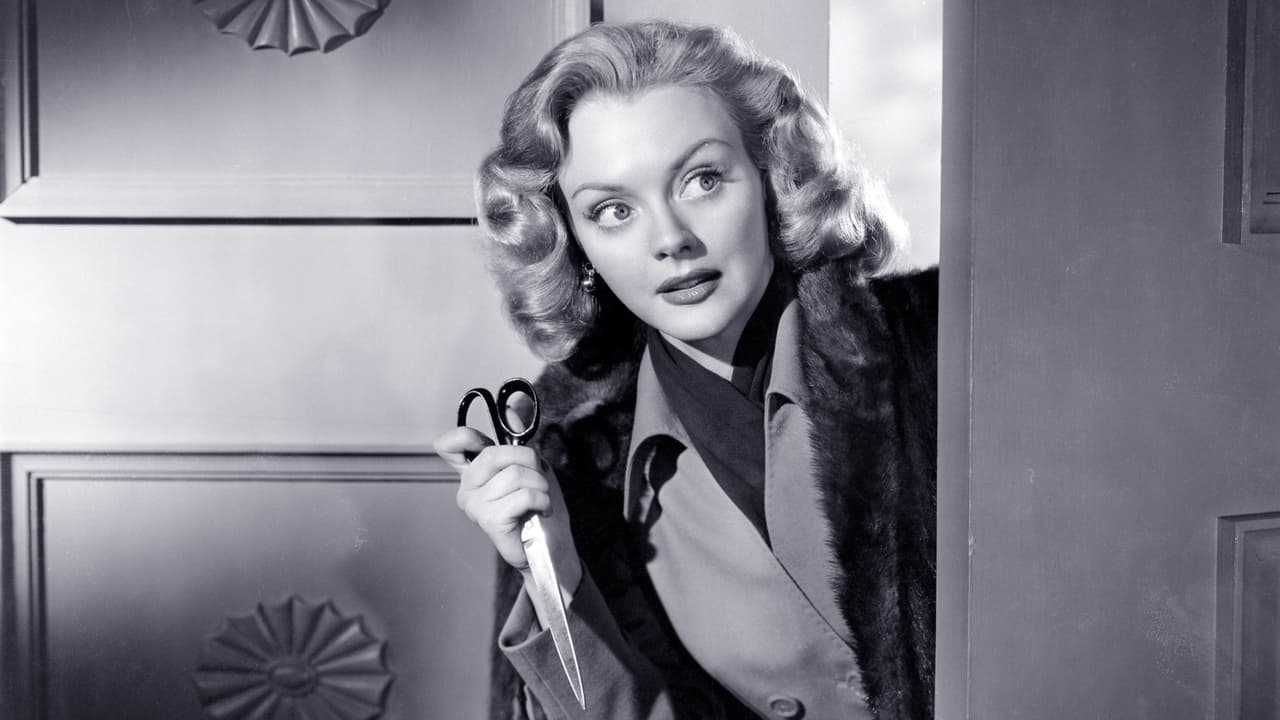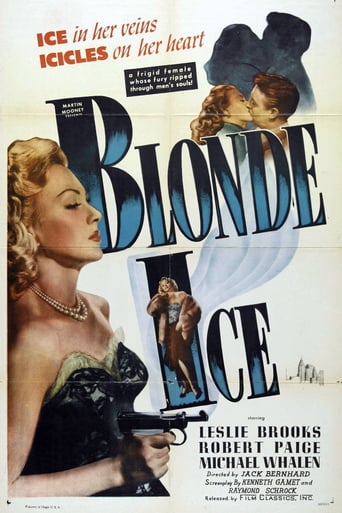UnowPriceless
hyped garbage
WillSushyMedia
This movie was so-so. It had it's moments, but wasn't the greatest.
Kodie Bird
True to its essence, the characters remain on the same line and manage to entertain the viewer, each highlighting their own distinctive qualities or touches.
Staci Frederick
Blistering performances.
Robert J. Maxwell
The psychopath is Leslie Brooks. She's young and has the pleasant, even features of a Hollywood actress. She has had several men on the hook in San Francisco but finally marries the richest of them all and then murders him, leaving a staged suicide scene. She's used her former lover, the immortal Robert Paige, as part of her alibi, although he's unwitting and believes her to be innocent of anything beyond a hasty marriage.Brooks takes up with the devoted but slightly dumb Paige again but quickly discovers the possibility of another conquest -- Michael Whalen as a newly elected Congressman, soon to depart the city for Washington. Whalen is even dumber than Paige. He falls for her in a jiffy and announces their marriage. But when Whalen finds out what she's really like, thanks to a presumably perceptive shrink in an underwritten part, he tries to back out of the nuptials. She kills him and frames Paige.So far -- well, if not "so good", at least "so adequate for the purposes". But the movie implodes at the end. Brooks is in her newspaper office, typing one of her last society columns. She has a Niagara of money coming her way once her first husband's estate is out of probate, or whatever it's called. Paige has been successfully framed for Whalen's murder. She has nothing to fear and has shown no sign of guilt or remorse.Yet, it's at this point that the police and the shrink enter her office, she stands up with a big smile, and spills all the beans, including her murder of a third man whose unimportance to the plot justifies his not having been mentioned until now. Hearing her confession, Paige slumps a little and makes a disillusioned remark. "I'll KILL you!", shouts Brooks for no particular reason, grabs a pistol, and is wrestled to the floor as the gun goes off and she's accidentally killed. The scene is just as bad as it sounds here.Brooks is pretty enough but her acting is obvious. Paige isn't called on to do very much except be friendly, trusting, understanding, and a little dense. Walter Sande is a mutual friend and employer of both at the newspaper and he's sympathetic. Most interesting character award goes to James Griffith as a fellow reporter and one of Brook's discarded boy friends. You'll know him when you see him. He's tall, narrow-shouldered, and has the longest neck of anyone in the movie. It has a sizable laryngeal prominence that can actually be seen bobbing up and down when he speaks. He has the best lines too. They're not worth quoting here, nor are any of the other lines, because the screenplay is functional but no more than that. The direction by Jack Bernhard has one or two imaginative moments.The problem is that B features like this were ground out by the hundreds during the 30s and 40s, doomed to second billing, and the budgets were very low. You don't get the production values that might rescue the film. Every scene here seems to be indoors because shooting on a set is cheap and fast. And you don't get the talent. Leslie Brooks is okay, but if you want to see a woman who exploits men the way Brooks does, and who gives a fine performance to boot, watch Barbara Stanwyck in "Double Indemnity."
classicsoncall
Cool title (no pun intended). This noirish little flick actually has a couple gems of dialog sprinkled throughout, like the one offered by Claire Cummings' first husband Carl Hanneman (John Holland) - "Don't you think you were being a little affectionate for a newly married woman"? That's all that's needed to set the viewer up for a cold and calculating femme fatale on the prowl for upward mobility. I have to say, Leslie Brooks fits the definition of gorgeous babe, but you'll also find her picture in the dictionary next to 'bitch on wheels'. I do wish the writing here was a bit more clever and the the acting much better than the amateurish portrayals we got. Seriously, did Claire (Brooks) really have to call room service with a menu to order OJ, toast and coffee? I can do that without even thinking about it.It doesn't take much for even the casual film viewer to figure this one out well before it's over. What's cool though (there's that word again) is the way Claire rakes all of her lovers over the coals before giving them the old heave-ho. And what gives with that pilot Blackie (Russ Vincent)? I've seen it before and can't figure out why a guy would try to shake someone down who's already shown a propensity to kill. It doesn't take much to pull the trigger one more time now, does it?But you know, this is just one entertaining little flick. I wouldn't go so far as to actually call it a noir film; the only real bad apple is the peach who runs the table with the men in her life. What the picture could have used was a more satisfying ending. It made no sense at all that Claire would come clean just on the old shrink's say so. I'm still mulling that one over.As for actress Leslie Brooks, this was the first time I've seen her, and was intrigued enough to check her credits here on the IMDb. Curiously, she appeared in twenty seven pictures throughout the Forties, and then one more in 1971. I wonder what that was all about.
kidboots
Unfortunately for the movie going public "Blonde Ice" was almost Leslie Brooks' last film (she was second female lead to Joan Bennett in "The Scar" (1949)). "Blonde Ice" was one of her leading roles and she was fantastic - a pity she didn't get more of these roles that she could sink her teeth into. Before I saw this film I remembered her most in "Cover Girl" (1945) - She played Rusty's catty rival (the one who gave her tips on how to impress the editors).Claire Cummings, (Leslie Brooks) a gossip reporter, has just married wealthy businessman Carl Hanneman (John Holland) but that doesn't stop her from pigeon-holing Les (Robert Paige), a former flame, and pledging her undying love for him - he, of course, is flabbergasted!!! Later at the race track Carl is astonished at the amount she is betting ($500) even though she wins!! A letter reveals that she is tired of Carl and her marriage. Carl accidentally sees the letter and announces the marriage is over. She concocts a plot that involves Les, a sports reporter -he is suspicious and wonders why Carl has taken a business trip on their honeymoon. When Claire decides to pop into her apartment to freshen up, they find Carl dead - Les assumes it is suicide and Claire agrees. The police believe it is murder but Claire gets off through lack of evidence. The next day she asks for her old job back - she feels she must carry on!!!She soon sets her cap at Stanley Mason (Michael Whalen) a high powered attorney, who, she wants to represent her late husband's estate. Like Carl, he is completely under her spell and he is also able to get the police to close her late husband's file. A blackmailer, who has helped give Claire an alibi but now wants payment, is shot in the back - by Claire!! Mason starts to have second thoughts about Claire and after talking to a doctor tries to convince Claire that she needs counseling to help her deal with issues she has about wealth, power and ambition. Unfortunately Claire doesn't like that idea. At the end she has made her own headlines and her true colours shine forth - even to a dope like Les.The only films I have seen Robert Paige in are "Can't Help Singing" (1944) where he co-starred opposite Deanna Durbin in a Technicolored musical western and "Split Second" (1953) a rather good thriller directed by Dick Powell - he has been in dozens of films but to me he is just not that memorable. Which made him perfect for the role of Les. Michael Whalen, who played Stanley Mason, started out as a leading man in a couple of Shirley Temple movies ("Poor Little Rich Girl" (1936) and "Wee Willie Winkie" (1938)) and later developed into a character actor.Recommended.
Bucs1960
This is an obscure noir film which is seldom seen but will show up at film festivals that celebrate the "B" productions of the 1940s and '50s. That's where I got the chance to see Leslie Brooks weave cinema magic as the coldest babe in town. Her performance ranks right up there with the wonderful Ann Savage's Vera in the greatest "B" of all times, "Detour".Brooks plays a newspaper columnist who goes from one wealthy victim to another, kills, inherits the money and moves on. A blackmailer gets in her way so she dispatches him as well. All the while, her ex-boyfriend, played by Robert Paige, a familiar face to movie buffs,is hanging around on the fringes of her life. He becomes the main suspect in the murders and complications arise.Brooks should have gone on to bigger and better things but, here again, her career mirrors the aforementioned Ann Savage. The low budget films were not always a stepping stone to stardom.This is an unusual film with a totally unrepentant and psychologically twisted main character who, in a word, is a bitch. The supporting cast is strong and the cinematography is quite good. Now that I have said that, I must admit that this is definitely a "B" film and can sometimes be rather hard going. But it is Leslie Brooks that makes it worthwhile. The film was made by Film Classics, originally a releasing company, which tried it's hand at it's own productions, with some limited success. The company disappeared early in the 1950s, as did most of the Poverty Row studios, much to the chagrin of all aficionados of the genre. "Blonde Ice" is one of the stars in the crown of low budget film making due to Brooks. Make an effort to find it.

